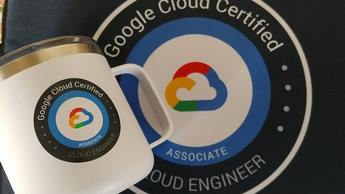
Professional Cloud Security Engineer: Professional Cloud Security Engineer
PDFs and exam guides are not so efficient, right? Prepare for your Google examination with our training course. The Professional Cloud Security Engineer course contains a complete batch of videos that will provide you with profound and thorough knowledge related to Google certification exam. Pass the Google Professional Cloud Security Engineer test with flying colors.

Curriculum for Professional Cloud Security Engineer Certification Video Course
| Name of Video | Time |
|---|---|
 1. Regions & Zones |
9:00 |
 2. GCP services (Cloud Security Exam) |
5:00 |
| Name of Video | Time |
|---|---|
 1. Section Introduction |
2:00 |
 2. How Google Secure GCP Infrastructure |
9:00 |
 3. Shared Responsibility Model |
3:00 |
| Name of Video | Time |
|---|---|
 1. Cloud Identity - Google Account |
11:00 |
 2. Cloud Identity - Google WorkSpace |
9:00 |
![Play Video: [Hands-on] Cloud Identity Domain Account](/design/img/playBtn.png) 3. [Hands-on] Cloud Identity Domain Account |
8:00 |
![Play Video: [Hands-on] Verify Cloud Identity Domain](/design/img/playBtn.png) 4. [Hands-on] Verify Cloud Identity Domain |
6:00 |
| Name of Video | Time |
|---|---|
![Play Video: [Hands-on] Create GCP Free Tier Account with Cloud Identity](/design/img/playBtn.png) 1. [Hands-on] Create GCP Free Tier Account with Cloud Identity |
9:00 |
![Play Video: [Hands-on] Create GCP Free Tier Account with Google Account](/design/img/playBtn.png) 2. [Hands-on] Create GCP Free Tier Account with Google Account |
10:00 |
| Name of Video | Time |
|---|---|
 1. Explore Google Admin Console |
9:00 |
![Play Video: [Hands-on] Adding users](/design/img/playBtn.png) 2. [Hands-on] Adding users |
14:00 |
![Play Video: [Hands-on] Create Google Groups](/design/img/playBtn.png) 3. [Hands-on] Create Google Groups |
9:00 |
 4. Password Policy and Enforce 2 SV verification |
7:00 |
 5. Google Cloud Directory Sync |
4:00 |
 6. SAML - SSO Configure |
6:00 |
| Name of Video | Time |
|---|---|
 1. Resource Hierarchy in GCP (Org, Folder and Projects) |
4:00 |
![Play Video: [Hands-on] Create Folders & Projects in GCP](/design/img/playBtn.png) 2. [Hands-on] Create Folders & Projects in GCP |
8:00 |
![Play Video: [Hands-on] Organization Policy - I](/design/img/playBtn.png) 3. [Hands-on] Organization Policy - I |
9:00 |
![Play Video: [Hands-on] Organization Policy - II](/design/img/playBtn.png) 4. [Hands-on] Organization Policy - II |
4:00 |
![Play Video: [Hands-on] Organization Policy - III](/design/img/playBtn.png) 5. [Hands-on] Organization Policy - III |
4:00 |
| Name of Video | Time |
|---|---|
 1. Identity & Access management (Identity, Roles & Permissions) |
12:00 |
 2. Primitive Roles |
11:00 |
 3. Pre-Defined Roles |
9:00 |
![Play Video: [Hands-on] Assign Primitive Roles to User](/design/img/playBtn.png) 4. [Hands-on] Assign Primitive Roles to User |
11:00 |
![Play Video: [Hands-on] Assign Pre-Defined Roles to User](/design/img/playBtn.png) 5. [Hands-on] Assign Pre-Defined Roles to User |
8:00 |
![Play Video: [Hands-on] Define Custom Role & Assignment Part - I](/design/img/playBtn.png) 6. [Hands-on] Define Custom Role & Assignment Part - I |
9:00 |
![Play Video: [Hands-on] Define Custom Role & Assignment Part - II](/design/img/playBtn.png) 7. [Hands-on] Define Custom Role & Assignment Part - II |
10:00 |
![Play Video: [Hands-on] Assign Role at Organization & Folder level](/design/img/playBtn.png) 8. [Hands-on] Assign Role at Organization & Folder level |
10:00 |
| Name of Video | Time |
|---|---|
 1. Introduction to Service Accounts |
6:00 |
![Play Video: [Hands-on] Create Service Account](/design/img/playBtn.png) 2. [Hands-on] Create Service Account |
6:00 |
![Play Video: [Hands-on] Virtual machine with Service Account](/design/img/playBtn.png) 3. [Hands-on] Virtual machine with Service Account |
6:00 |
![Play Video: [Hands-on] Cloud API Access Scope - Legacy](/design/img/playBtn.png) 4. [Hands-on] Cloud API Access Scope - Legacy |
13:00 |
![Play Video: [Hands-on] Cloud API Access Scope - IAM](/design/img/playBtn.png) 5. [Hands-on] Cloud API Access Scope - IAM |
4:00 |
![Play Video: [Hands-on] Service Account User Role](/design/img/playBtn.png) 6. [Hands-on] Service Account User Role |
9:00 |
![Play Video: [Hands-on] Impersonate Service Account to user](/design/img/playBtn.png) 7. [Hands-on] Impersonate Service Account to user |
10:00 |
![Play Video: [Hands-on] Service Account RSA private keys](/design/img/playBtn.png) 8. [Hands-on] Service Account RSA private keys |
9:00 |
| Name of Video | Time |
|---|---|
 1. CIDR notation |
6:00 |
 2. Virtual Private Network & subnets |
10:00 |
![Play Video: [Hands-on] Explore Default VPC](/design/img/playBtn.png) 3. [Hands-on] Explore Default VPC |
12:00 |
![Play Video: [Hands-on] Create Auto Mode VPC](/design/img/playBtn.png) 4. [Hands-on] Create Auto Mode VPC |
6:00 |
![Play Video: [Hands-on] Create Custom Mode VPC](/design/img/playBtn.png) 5. [Hands-on] Create Custom Mode VPC |
6:00 |
![Play Video: [Hands-on] Create Virtual Machine with all subnet](/design/img/playBtn.png) 6. [Hands-on] Create Virtual Machine with all subnet |
12:00 |
 7. Firewall Rules |
5:00 |
![Play Video: [Hands-on] Create Firewall Rule - SSH](/design/img/playBtn.png) 8. [Hands-on] Create Firewall Rule - SSH |
10:00 |
 9. Internal vs External IP Address |
4:00 |
![Play Video: [Hands-on] Internal vs External IP Address](/design/img/playBtn.png) 10. [Hands-on] Internal vs External IP Address |
13:00 |
![Play Video: [Hands-on] Static vs Ephemeral IP Address](/design/img/playBtn.png) 11. [Hands-on] Static vs Ephemeral IP Address |
11:00 |
| Name of Video | Time |
|---|---|
 1. Idea behind Shared VPC |
5:00 |
![Play Video: [Hands-on] Deploy Shared VPC](/design/img/playBtn.png) 2. [Hands-on] Deploy Shared VPC |
11:00 |
![Play Video: [Hands-on] Deploy Shared VPC (CNTD...)](/design/img/playBtn.png) 3. [Hands-on] Deploy Shared VPC (CNTD...) |
10:00 |
 4. Introduction to VPC Peering |
5:00 |
![Play Video: [Hands-on] VPC Peering](/design/img/playBtn.png) 5. [Hands-on] VPC Peering |
11:00 |
| Name of Video | Time |
|---|---|
 1. GCP Hybrid Connectivity Options |
6:00 |
![Play Video: [Hands-on] Create Cloud Interconnect Request](/design/img/playBtn.png) 2. [Hands-on] Create Cloud Interconnect Request |
7:00 |
 3. Dedicated Interconnect vs partner Interconnect |
2:00 |
| Name of Video | Time |
|---|---|
 1. DNSSEC |
3:00 |
![Play Video: [Hands-on] Google private Access](/design/img/playBtn.png) 2. [Hands-on] Google private Access |
9:00 |
 3. IAP - Identity Aware Proxy Part - I |
14:00 |
 4. IAP - Identity Aware Proxy Part - II |
10:00 |
 5. IAP - Identity Aware Proxy Part - III |
9:00 |
| Name of Video | Time |
|---|---|
 1. Introduction to DLP API |
6:00 |
![Play Video: [Hands-on] DLP API Demo](/design/img/playBtn.png) 2. [Hands-on] DLP API Demo |
4:00 |
 3. TEMPLATES, INFO_TYPES & MATCH |
6:00 |
![Play Video: [Hands-on] Create Stored INFO_TYPE](/design/img/playBtn.png) 4. [Hands-on] Create Stored INFO_TYPE |
12:00 |
![Play Video: [Hands-on] Create Template](/design/img/playBtn.png) 5. [Hands-on] Create Template |
7:00 |
![Play Video: [Hands-on] Create Job For Inspection](/design/img/playBtn.png) 6. [Hands-on] Create Job For Inspection |
14:00 |
![Play Video: [Hands-on] Template for De-Identification](/design/img/playBtn.png) 7. [Hands-on] Template for De-Identification |
11:00 |
| Name of Video | Time |
|---|---|
 1. Introduction to Encryption |
7:00 |
![Play Video: [Hands-on] Cloud KMS - Google Managed Encryption keys](/design/img/playBtn.png) 2. [Hands-on] Cloud KMS - Google Managed Encryption keys |
14:00 |
![Play Video: [Hands-on] Customer Managed encryption keys](/design/img/playBtn.png) 3. [Hands-on] Customer Managed encryption keys |
14:00 |
![Play Video: [Hands-on] Customer Supplied encryption keys](/design/img/playBtn.png) 4. [Hands-on] Customer Supplied encryption keys |
12:00 |
![Play Video: [Hands-on] Object Lifecycle Rules](/design/img/playBtn.png) 5. [Hands-on] Object Lifecycle Rules |
7:00 |
![Play Video: [Hands-on] App Secrets with Secret manager](/design/img/playBtn.png) 6. [Hands-on] App Secrets with Secret manager |
11:00 |
![Play Video: [Hands-on] Fetch Secret from Cloud Function](/design/img/playBtn.png) 7. [Hands-on] Fetch Secret from Cloud Function |
7:00 |
| Name of Video | Time |
|---|---|
 1. RPO & RTO |
7:00 |
![Play Video: [Hands-on] Backup Data Part - I](/design/img/playBtn.png) 2. [Hands-on] Backup Data Part - I |
10:00 |
![Play Video: [Hands-on] Backup Data Part - II](/design/img/playBtn.png) 3. [Hands-on] Backup Data Part - II |
9:00 |
![Play Video: [Hands-on] Database Backup](/design/img/playBtn.png) 4. [Hands-on] Database Backup |
6:00 |
![Play Video: [Hands-on] Database Backup (Cntd...)](/design/img/playBtn.png) 5. [Hands-on] Database Backup (Cntd...) |
2:00 |
![Play Video: [Hands-on] Web Security Scanner](/design/img/playBtn.png) 6. [Hands-on] Web Security Scanner |
7:00 |
![Play Video: [Hands-on] Security Command Center](/design/img/playBtn.png) 7. [Hands-on] Security Command Center |
8:00 |
 8. Cloud Logging |
7:00 |
![Play Video: [Hands-on] Explore Cloud Logging](/design/img/playBtn.png) 9. [Hands-on] Explore Cloud Logging |
7:00 |
![Play Video: [Hands-on] Cloud Log Sinks](/design/img/playBtn.png) 10. [Hands-on] Cloud Log Sinks |
5:00 |
![Play Video: [Hands-on] Container Scanning API](/design/img/playBtn.png) 11. [Hands-on] Container Scanning API |
4:00 |
![Play Video: [Hands-on] Binary Authorization](/design/img/playBtn.png) 12. [Hands-on] Binary Authorization |
9:00 |
 13. Forseti Security |
7:00 |
Google Professional Cloud Security Engineer Exam Dumps, Practice Test Questions
100% Latest & Updated Google Professional Cloud Security Engineer Practice Test Questions, Exam Dumps & Verified Answers!
30 Days Free Updates, Instant Download!
Professional Cloud Security Engineer Premium Bundle

- Premium File: 361 Questions & Answers. Last update: Jan 10, 2026
- Training Course: 89 Video Lectures
- Study Guide: 335 Pages
- Latest Questions
- 100% Accurate Answers
- Fast Exam Updates
Google Professional Cloud Security Engineer Training Course
Want verified and proven knowledge for Professional Cloud Security Engineer? Believe it's easy when you have ExamSnap's Professional Cloud Security Engineer certification video training course by your side which along with our Google Professional Cloud Security Engineer Exam Dumps & Practice Test questions provide a complete solution to pass your exam Read More.
Ultimate Preparation Guide for Google Professional Cloud Security Engineer Certification
Master Google Cloud Platform (GCP) with over 50 hands-on demo labs and fully prepare for the GCP Professional Cloud Security Engineer Exam.
Course Overview
The Google Professional Cloud Security Engineer Certification course is designed to equip IT professionals with the knowledge and skills required to secure Google Cloud Platform (GCP) environments. As organizations increasingly migrate to cloud infrastructures, ensuring the security of cloud workloads has become a critical responsibility. This course provides a comprehensive understanding of GCP security features, best practices for designing secure cloud environments, and hands-on experience implementing protective measures across multiple services.
Participants will explore the shared responsibility model in cloud security, which emphasizes collaboration between cloud providers and customers to maintain robust security postures. Throughout the course, learners will engage in practical exercises, real-world case studies, and scenario-based simulations that reflect the challenges faced by cloud security engineers in modern enterprises. The training also prepares students for the professional certification exam, ensuring they can demonstrate both theoretical knowledge and applied skills in cloud security management.
By the end of the course, participants will have a solid foundation in GCP security operations, identity and access management, data protection, network security, and compliance strategies. Additionally, learners will gain insight into monitoring and auditing tools, threat detection techniques, and automation strategies to maintain secure cloud environments efficiently.
What You Will Learn From This Course
Implement identity and access management policies to enforce least privilege access across GCP services
Secure data at rest and in transit using encryption techniques, including key management solutions
Configure network security using Virtual Private Cloud (VPC) architecture, firewalls, and private access options
Detect and respond to security incidents using GCP monitoring, logging, and threat detection services
Apply regulatory compliance controls and risk management strategies in cloud environments
Integrate security into DevOps pipelines and automate security processes for consistent policy enforcement
Conduct security audits and analyze logs to identify vulnerabilities and potential breaches
Design and deploy secure cloud solutions following industry best practices and Google Cloud recommendations
Prepare for the Google Professional Cloud Security Engineer certification exam with scenario-based questions and practice labs
Understand emerging security trends in cloud computing, including zero-trust architecture and advanced threat protection
This course ensures participants develop both a practical and strategic understanding of cloud security, enabling them to secure workloads, protect sensitive data, and maintain compliance in dynamic cloud environments.
Learning Objectives
The learning objectives of this course are structured to ensure participants gain the competencies required for professional practice and certification. By completing this course, learners will be able to:
Design and implement robust identity and access management policies to safeguard resources
Deploy encryption solutions and manage encryption keys to protect sensitive data
Configure network security controls, including firewalls, private access, and secure connectivity options
Utilize GCP security monitoring, logging, and threat detection tools to maintain situational awareness
Apply risk assessment methodologies to identify vulnerabilities and mitigate threats in cloud deployments
Integrate compliance frameworks and automate security governance processes across GCP projects
Respond effectively to security incidents using cloud-native tools and incident response plans
Implement security best practices in hybrid and multi-cloud architectures to ensure consistent protection
Demonstrate expertise in GCP security concepts through practical labs, projects, and exam preparation
Develop the skills to continuously monitor, audit, and improve cloud security posture in real-world environments
These objectives are designed to provide a strong foundation for participants seeking to excel as professional cloud security engineers.
Requirements
To successfully engage with this course, learners should meet several basic requirements that will ensure they can follow along with technical content and hands-on exercises:
Basic understanding of cloud computing concepts, including service models and deployment models
Familiarity with networking concepts, such as IP addressing, subnets, firewalls, and routing
Fundamental knowledge of Linux or Windows server administration for managing cloud resources
Experience with security concepts, including encryption, authentication, and access control
Access to a Google Cloud Platform account to perform hands-on labs and exercises
Internet connectivity and a browser compatible with GCP Console for managing cloud resources
A willingness to learn and apply best practices for cloud security in practical scenarios
These requirements are intended to provide learners with the foundation needed to navigate the course successfully while gaining maximum benefit from the exercises and labs provided.
Course Description
This Google Professional Cloud Security Engineer course is a structured, in-depth program that guides participants through the security landscape of Google Cloud Platform. It covers all aspects of cloud security management, from designing secure architectures to implementing operational security controls, and prepares learners for certification in a methodical, hands-on approach.
The course begins with an overview of GCP services, security responsibilities, and the shared responsibility model. Participants will explore identity and access management, learning how to configure roles, service accounts, and policies to control access to cloud resources. The course then delves into data protection, emphasizing encryption at rest and in transit, data loss prevention, and key management.
Network security is a central component of the curriculum, where learners configure VPCs, firewalls, private access, and secure connectivity options. Security operations are introduced through monitoring, logging, incident detection, and automated response strategies, ensuring participants understand how to maintain continuous security vigilance.
The course also incorporates compliance and risk management modules, which teach students to apply regulatory standards such as GDPR and HIPAA, implement organizational policies, and conduct audits to mitigate risk. Real-world scenarios and projects reinforce theoretical knowledge, giving learners the confidence to secure cloud environments in practical settings.
Throughout the course, participants gain hands-on experience through labs, exercises, and projects that mirror the challenges faced by cloud security professionals. This approach ensures that learners can translate knowledge into actionable skills that improve organizational security posture while preparing for the professional certification exam.
Target Audience
This course is designed for IT professionals, cloud engineers, and security specialists who are responsible for securing cloud environments or aspiring to specialize in cloud security. It is particularly suitable for the following groups:
Cloud security engineers seeking certification to validate their expertise in Google Cloud Platform security
IT administrators and network engineers responsible for implementing security measures in cloud environments
Security analysts and compliance officers tasked with monitoring cloud workloads and maintaining regulatory compliance
Developers and DevOps engineers who need to integrate security practices into CI/CD pipelines and cloud-native applications
Professionals planning to transition into cloud security roles and seeking a structured learning path with certification preparation
Organizations aiming to train their teams on cloud security best practices and secure GCP deployments
By targeting this audience, the course ensures participants gain relevant skills that directly apply to their professional responsibilities and career growth.
Prerequisites
While the course is accessible to those with foundational IT knowledge, some prerequisites are recommended to maximize learning outcomes:
Understanding of basic networking concepts, including IP routing, subnets, and firewall rules
Familiarity with cloud computing models, such as IaaS, PaaS, and SaaS
Experience with basic operating system administration, including user management and permissions
Knowledge of security principles, including authentication, authorization, encryption, and access control
Comfort with command-line tools for cloud resource management
A willingness to engage with hands-on labs and follow along with practical exercises in GCP
Meeting these prerequisites ensures participants can fully engage with the technical content and gain practical experience throughout the course.
Course Modules/Sections
The Google Professional Cloud Security Engineer Certification course is divided into well-structured modules, each designed to build expertise in critical areas of cloud security. The first module focuses on the fundamentals of Google Cloud Platform security, including an introduction to the shared responsibility model and the principles of designing secure cloud architectures. Participants will explore GCP services in depth, understanding how to configure them securely while considering operational and compliance requirements.
The second module delves into identity and access management, covering the creation of roles, service accounts, and policies to enforce least privilege access. Learners will practice implementing fine-grained access controls and auditing permissions to ensure that only authorized users can access critical resources. This module provides a strong foundation for managing access across complex cloud environments while adhering to security best practices.
The third module emphasizes data protection and encryption, teaching participants how to secure sensitive information both at rest and in transit. Topics include encryption key management, data loss prevention techniques, and configuring storage solutions like Cloud Storage and BigQuery securely. Hands-on exercises reinforce these concepts, allowing learners to apply them in practical scenarios.
The fourth module covers network security, including the design and implementation of Virtual Private Cloud (VPC) networks, firewall configurations, private access options, and secure connectivity between cloud and on-premises environments. Participants will gain experience deploying security controls to protect workloads and prevent unauthorized access to sensitive data.
The fifth module focuses on security operations and monitoring, including logging, monitoring, threat detection, and incident response. Learners will become proficient in using GCP-native tools to detect anomalies, respond to security incidents, and maintain continuous vigilance over cloud resources. This module emphasizes practical, scenario-based learning to ensure that participants can manage security operations effectively.
The final module is centered on compliance and risk management, teaching participants how to map GCP services to regulatory frameworks such as GDPR and HIPAA. Learners will explore strategies for audit logging, risk assessment, and policy enforcement, ensuring that cloud environments remain secure and compliant. Each module integrates hands-on labs, projects, and exercises to provide learners with practical experience alongside theoretical knowledge.
Key Topics Covered
Throughout this course, participants explore a wide range of key topics essential to mastering cloud security within Google Cloud Platform. These topics begin with an overview of cloud security fundamentals, providing an understanding of the shared responsibility model, cloud service models, and common security challenges encountered in cloud deployments. This foundational knowledge allows learners to contextualize subsequent modules and understand how security considerations impact architecture decisions.
Identity and access management is a core area of study, where learners explore role-based access controls, service accounts, organizational policies, and policy inheritance. Participants learn to configure permissions securely, audit access logs, and implement automation for consistent access management across projects. Understanding these concepts is critical for preventing unauthorized access and ensuring compliance with organizational security policies.
Data protection and encryption constitute another major topic area. Learners examine techniques for encrypting data both at rest and in transit, including the use of Cloud Key Management Service for key rotation and management. Data loss prevention strategies, such as the detection of sensitive information and masking techniques, are also covered. Participants gain hands-on experience configuring encrypted storage solutions and applying data protection policies across GCP services.
Network security is emphasized through topics such as VPC configuration, firewall rules, private connectivity, and secure hybrid network design. Participants explore how to segment networks, enforce traffic restrictions, and monitor network activity to prevent breaches and mitigate threats. Cloud Armor and Security Command Center are introduced to provide additional layers of protection against external and internal threats.
Security operations and monitoring topics include logging, alerting, incident response, and threat detection. Participants learn to utilize centralized monitoring tools to maintain visibility into cloud environments, detect suspicious activities, and respond effectively to potential incidents. Automation strategies are also discussed to streamline security operations and reduce manual intervention.
Finally, compliance and risk management topics cover regulatory requirements, organizational policies, audit procedures, and risk mitigation strategies. Learners gain insight into how to ensure that cloud deployments meet industry standards, adhere to internal policies, and maintain continuous compliance. By covering these key topics, the course prepares participants to secure cloud environments comprehensively while preparing for certification assessments.
Teaching Methodology
The teaching methodology employed in this Google Professional Cloud Security Engineer Certification course emphasizes a blend of theoretical instruction and hands-on practice. Each module begins with conceptual overviews that introduce learners to critical cloud security principles, followed by interactive demonstrations that illustrate how these concepts are applied in real-world scenarios. This approach ensures that participants not only understand security theory but also gain practical skills that can be applied immediately in their professional environments.
Hands-on labs play a central role in the teaching methodology, allowing learners to practice implementing security configurations, monitoring tools, and incident response strategies in controlled GCP environments. These exercises simulate real-world challenges, reinforcing learning and building confidence in applying knowledge to complex security situations. Lab activities are designed to be progressive, starting with basic tasks and advancing to comprehensive projects that integrate multiple security concepts.
Scenario-based learning is another key aspect of the methodology. Participants are presented with security incidents, compliance challenges, and architectural dilemmas that require critical thinking and problem-solving. By working through these scenarios, learners develop analytical skills and the ability to make informed decisions under pressure. This approach mirrors the practical challenges faced by professional cloud security engineers and ensures readiness for both operational responsibilities and certification exams.
Instructor-led discussions complement self-paced exercises, providing opportunities for participants to ask questions, share insights, and learn from expert experiences. These discussions cover best practices, common pitfalls, and emerging trends in cloud security, offering participants a broader perspective on their roles and responsibilities. Overall, the teaching methodology balances theory, practice, and interactive learning to produce professionals capable of securing Google Cloud environments effectively.
Assessment & Evaluation
Assessment and evaluation within this course are designed to ensure participants have acquired both theoretical understanding and practical proficiency in cloud security. Learners are evaluated through a combination of quizzes, hands-on labs, scenario-based exercises, and project work. Each assessment is structured to measure knowledge of key concepts, ability to implement security controls, and competence in responding to cloud security incidents.
Quizzes are administered at the end of each module to reinforce learning and test comprehension of core topics. These quizzes include multiple-choice, true/false, and scenario-based questions that reflect the type of challenges participants may encounter on the Google Professional Cloud Security Engineer certification exam. Feedback is provided immediately, helping learners identify areas for improvement and clarify any misunderstandings.
Hands-on labs serve as a primary tool for evaluating practical skills. Participants must complete tasks such as configuring identity and access management policies, setting up encryption and data protection mechanisms, deploying secure network architectures, and monitoring cloud environments. Lab performance is assessed based on the accuracy, completeness, and effectiveness of implemented solutions. This evaluation ensures that learners can translate theoretical knowledge into actionable security practices.
Scenario-based exercises are another form of assessment, where learners are presented with realistic security challenges and asked to develop response plans. These exercises evaluate analytical thinking, problem-solving abilities, and decision-making under simulated operational conditions. Additionally, final project assignments require participants to design and implement secure GCP environments, integrating concepts from multiple modules. Evaluation of projects considers design rationale, adherence to security best practices, and practical implementation.
Ongoing feedback and performance tracking throughout the course help learners monitor their progress, address gaps in knowledge, and build confidence in their ability to secure cloud environments. By combining quizzes, labs, scenarios, and projects, the assessment methodology provides a comprehensive evaluation of both understanding and practical competence, ensuring participants are well-prepared for professional responsibilities and certification success.
Benefits of the Course
The Google Professional Cloud Security Engineer Certification course offers numerous benefits for IT professionals seeking to enhance their expertise in cloud security. One of the primary advantages is the comprehensive knowledge participants gain about Google Cloud Platform security features, including identity and access management, data protection, and network security. This knowledge enables professionals to design and implement secure cloud architectures that protect organizational data, maintain compliance, and reduce risk exposure.
Another significant benefit is the practical, hands-on experience provided throughout the course. Learners engage in labs, scenario-based exercises, and projects that simulate real-world cloud security challenges, allowing them to apply theoretical concepts in practical environments. This experiential learning fosters confidence and competence in managing cloud workloads securely and efficiently.
Certification preparation is also a major benefit of the course. By covering the exam blueprint, providing practice questions, and offering guidance on scenario-based problem solving, the course equips participants to succeed in the Google Professional Cloud Security Engineer certification exam. Successfully earning this certification validates professional expertise, enhances career prospects, and can lead to higher earning potential and greater responsibilities in cloud security roles.
Participants also benefit from exposure to industry best practices, emerging trends, and advanced security concepts, such as zero-trust architecture, threat detection, and automation in cloud security operations. These insights allow learners to adopt proactive security measures and anticipate future challenges in dynamic cloud environments. Furthermore, the course helps organizations build internal capabilities, ensuring that teams can implement consistent security policies, maintain compliance, and safeguard critical digital assets. Overall, the combination of theoretical knowledge, hands-on practice, certification preparation, and exposure to advanced security strategies makes this course an invaluable investment for individuals and organizations committed to excellence in cloud security.
Course Duration
The Google Professional Cloud Security Engineer Certification course is designed to provide an in-depth learning experience within a structured timeframe. While the exact duration may vary depending on the learning format and participant pace, the typical course spans approximately six to eight weeks when completed in a part-time, instructor-led format. For those pursuing self-paced learning, the duration may extend to accommodate individual study schedules and lab completion, generally ranging from eight to twelve weeks.
Each module is carefully designed to balance theoretical instruction, hands-on labs, and scenario-based exercises. Participants typically spend several hours per week engaging with video lectures, tutorials, and reading materials, followed by dedicated lab sessions that provide practical experience. In addition, regular quizzes and assessments are scheduled throughout the course to reinforce knowledge and track progress.
The course duration also accounts for project work and final assessments, which integrate multiple security concepts and simulate real-world cloud security environments. By the end of the program, learners will have invested a substantial amount of time in understanding, practicing, and mastering cloud security principles, ensuring they are well-prepared for professional responsibilities and certification examinations. The flexible duration allows both working professionals and students to plan their learning journey according to personal and professional commitments while still achieving comprehensive mastery of Google Cloud security concepts.
Tools & Resources Required
To successfully complete the Google Professional Cloud Security Engineer Certification course, participants require access to specific tools and resources that enable hands-on practice and effective learning. The primary resource is a Google Cloud Platform account, which provides access to GCP services such as Compute Engine, Cloud Storage, BigQuery, Cloud IAM, and Cloud Security Command Center. A valid account allows learners to implement security policies, configure networks, and test encryption and monitoring features in real-world cloud environments.
Participants also need a modern web browser compatible with the GCP Console, as many labs and exercises are conducted directly through the cloud interface. Reliable internet connectivity is essential to ensure uninterrupted access to course materials, labs, and online assessments. In addition, learners may benefit from local development tools, such as text editors or integrated development environments (IDEs), to interact with scripts, APIs, and automation tools used in security configurations and monitoring processes.
Supplementary resources include documentation, whitepapers, and tutorials provided by Google Cloud, which offer detailed guidance on service configurations, security best practices, and compliance requirements. Participants may also leverage third-party study guides, video tutorials, and community forums to reinforce learning and troubleshoot challenges encountered during labs. Access to networking and system administration tools, such as SSH clients, network monitoring utilities, and command-line interfaces, further enhances the ability to manage and secure cloud environments effectively. By utilizing these tools and resources, participants can engage fully with the course, complete hands-on exercises, and build the practical skills necessary to excel in professional cloud security roles and certification examinations.
Career Opportunities
Completing the Google Professional Cloud Security Engineer Certification opens a wide range of career opportunities in the rapidly growing field of cloud security. As organizations continue to migrate workloads to cloud platforms, the demand for professionals who can design, implement, and maintain secure cloud environments is increasing exponentially. Certified individuals are recognized as experts in securing Google Cloud Platform deployments, which positions them for high-impact roles across various industries.
One prominent career path is that of a Cloud Security Engineer. In this role, professionals are responsible for managing identity and access controls, configuring network security, implementing encryption solutions, and monitoring cloud environments for potential threats. They work closely with DevOps teams to integrate security into development pipelines and ensure that applications and data remain protected from unauthorized access and cyberattacks. Cloud Security Engineers also design and enforce security policies and ensure compliance with regulatory standards such as GDPR, HIPAA, and other industry-specific requirements.
Another opportunity is the role of Security Architect. Security Architects take a more strategic approach, designing secure cloud infrastructures, evaluating risks, and creating comprehensive security frameworks for organizations. They are responsible for developing long-term security strategies, conducting risk assessments, and recommending solutions that align with business goals. With the expertise gained from the certification course, professionals can create architectures that minimize vulnerabilities while supporting scalability, availability, and performance in cloud environments.
Cloud Security Analysts also benefit from this certification. Analysts focus on monitoring cloud workloads, detecting anomalies, and responding to incidents using tools like Cloud Security Command Center, Cloud Logging, and Cloud Monitoring. They investigate potential breaches, assess the impact of security events, and implement mitigation strategies. Professionals with this certification are well-equipped to analyze security data, provide actionable insights, and support continuous improvement in security operations.
In addition, compliance officers and risk managers with Google Cloud security expertise are highly sought after. These roles require understanding regulatory requirements, performing audits, and ensuring organizational adherence to legal and industry standards. The certification prepares professionals to bridge the gap between technical security measures and compliance needs, ensuring that cloud deployments meet governance and policy objectives.
Beyond technical roles, the certification also enhances career prospects for IT managers and consultants who advise organizations on cloud security strategy. By demonstrating proficiency in GCP security best practices, certified professionals gain credibility and influence when guiding teams or clients through secure cloud adoption. Overall, the Google Professional Cloud Security Engineer Certification opens doors to a variety of high-demand roles, increases earning potential, and positions individuals as leaders in the field of cloud security.
Enroll Today
Enrolling in the Google Professional Cloud Security Engineer Certification course is the first step toward advancing your career in cloud security and gaining the skills necessary to secure modern cloud environments. The course is designed for flexibility, offering both instructor-led and self-paced learning options that cater to different schedules and learning preferences. Whether you are a working professional seeking to enhance your expertise or a student preparing to enter the field, enrollment provides access to comprehensive training, hands-on labs, and scenario-based exercises that mirror real-world challenges.
By enrolling today, participants gain access to all course modules, covering identity and access management, data protection, network security, security operations, compliance, and risk management. Learners also benefit from structured guidance on exam preparation, practice quizzes, and project work, ensuring readiness for the Google Professional Cloud Security Engineer certification exam. The course provides practical experience with GCP tools and resources, helping participants develop the skills to implement and maintain secure cloud solutions effectively.
Enrollment also connects learners to a community of peers, instructors, and industry experts. This network allows participants to share insights, discuss challenges, and gain support throughout the learning journey. Access to updated course materials, documentation, and supplementary resources ensures that learners stay current with emerging cloud security trends, best practices, and tools.
Starting the course now enables participants to accelerate their career growth, enhance professional credibility, and position themselves for high-demand roles in cloud security. With the growing importance of securing cloud workloads, enrolling in this certification course represents a strategic investment in professional development. By taking action today, learners can build expertise, gain certification, and join the ranks of skilled cloud security professionals capable of protecting organizational assets and advancing cloud security initiatives.
Prepared by Top Experts, the top IT Trainers ensure that when it comes to your IT exam prep and you can count on ExamSnap Professional Cloud Security Engineer certification video training course that goes in line with the corresponding Google Professional Cloud Security Engineer exam dumps, study guide, and practice test questions & answers.
Purchase Individually




Google Training Courses













Only Registered Members can View Training Courses
Please fill out your email address below in order to view Training Courses. Registration is Free and Easy, You Simply need to provide an email address.
- Trusted by 1.2M IT Certification Candidates Every Month
- Hundreds Hours of Videos
- Instant download After Registration






